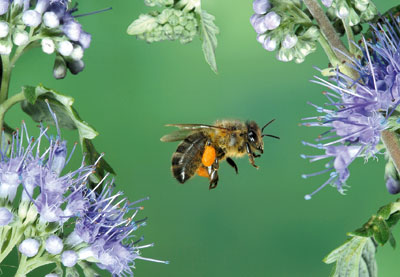Original Article:
http://www.economist.com/science/displaystory.cfm?story_id=13226733
 The bees are back in town
The bees are back in town
Mar 5th 2009
From The Economist print edition
The economic crisis has contributed to a glut of bees in California. That raises questions about whether a supposed global pollination crisis is real.
AT THE end of February, the orchards of Californias Central Valley are dusted with pink and white blossom, as millions of almond trees make their annual bid for reproduction. The delicate flowers attract pollinators, mostly honeybees, to visit and collect nectar and pollen. By offering fly-through hospitality, the trees win the prize of a brush with a pollen-covered bee and the chance of cross-pollination with another tree. In recent years, however, there has been alarm over possible shortages of honeybees and scary stories of beekeepers finding that 30-50% of their charges have vanished over the winter. It is called colony collapse disorder (CCD), and its cause remains a mystery.
Add to this worries about long-term falls in the populations of other pollinators, such as butterflies and bats, and the result is a growing impression of a threat to natures ability to supply enough nectar-loving animals to service mankinds crops. This year, however, the story has developed a twist. In California the shortage of bees has been replaced by a glut.
Bee good to me
The annual orgy of sexual reproduction in the Californian almond orchards owes little to the unintended bounty of nature. Francis Ratnieks, a professor of apiculture at Sussex University who has worked on the states almond farms, says the crop is so large and intensively grown these days that it has greatly surpassed the regions inherent ability to supply pollinators. Decades ago, when there were fewer almonds, farmers could rely on pollination just from the beekeepers who live in the Central Valley. Now, they have to import migrant apian labour.
Scientific AG, a firm based in Bakersfield, California, helps broker pollination deals between local almond growers and apiarists from across America. Joe Traynor, the pollination broker who founded Scientific AG, says that in the 1960s there were 100,000 acres (40,000 hectares) of groves. Today it is 700,000 acres and the industry claims it supplies 80% of the worlds almonds. In order to meet this pollination demand, more than a third of Americas beehives must be moved to California for the season. Such changes to the industry have been reflected in the prices for bee hives. In 1995 growers could rent a hive for $35. Today, says Mr Traynor, a strong colony would cost $150-200.
It is hard to pin down what has been causing honeybees to vanish. People want it to be genetically modified crops, pollution, mobile-phone masts and pesticides, says Dr Ratnieks, and it is almost certainly none of those. But he adds that such large losses to a population are not unusual in epidemics.
One explanation offered by both Dr Ratnieks and Mr Traynor is of a once-rare disease, possibly caused by the Israeli acute paralysis virus (IAPV), sweeping through colonies that have already been weakened by parasites such as Nosema ceranae, a parasitic fungus from Asia. Some have suggested that N. ceranae alone might be sufficient to cause CCD, as the fungus is believed to have been widespread since 2006, when CCD first became a problem. There is also Varroa, a parasitic mite, which has been another problem in bees for some time, and which might also transmit the IAPV. But there is almost certainly a further factor causing stress on the beesa poor diet.
Bee-conomics
It is increasingly being recognised that managed bees need food supplements. In some places, a decline in the area of pasture land on which they can forage, the loss of weedy borders and the growth of crop monocultures mean it is hard for bees to find a wide enough range of pollen sources to obtain all their essential amino acids. In extreme cases they may not even find enough basic protein. Writing in Bee Culture this February, Mr Traynor observes that places where crops with low-protein pollens, such as blueberries and sunflowers, are grown are also places where CCD has appeared.
The suggestion is that poor nutrition has weakened the bees immune systems, making them more vulnerable to viruses and other parasites. Feeding bees supplements, rather than relying on their ability to forage in the wild, costs time and money. Many beekeepers therefore try to avoid it. Anecdote suggests, however, that those who do fork out find their colonies are far more resistant to CCD.
This years Californian bee glut, then, has been caused by a mixture of rising supply meeting falling demand. The price of almonds dropped by 30% between August and December last year, as people had less money in their pockets. That has caused growers to cut costs, and therefore hire fewer hives. There is also a drought in the region, and many farmers are unlikely to receive enough water to go ahead with the harvest. Meanwhile, the recent high prices for pollination contracts made it look worthwhile fattening bees up with supplements over the winter. That may help explain why there have been fewer colony collapses.
The rise and fall of the managed honeybee, then, owes as much to the economics of supply and demand as it does to the forces of nature. And if the nutrition and disease theory is correct, next years lower contract prices may see beekeepers cutting back on supplemental feeding, and a resurgence of CCD.
Bee off with you!
Despite the importance of the honeybee, none of this is evidence of a wide-scale pollination crisis or a threat that is specific to pollinators. No one has shown that colonies of wild bees are collapsing any more frequently than they used to. And while it is true that many species of butterflies, moths, birds, bats and other pollinators are in retreat, their problems are far more likely to mirror broader declines in biodiversity that are the result of well-known phenomena such as habitat loss and the intensification of agriculture.
Troubling though this loss of diversity is, it does not necessarily translate into a decline in the amount of pollination going on. Jaboury Ghazoul of the Swiss Federal Institute of Technology in Zurich, writing in Trends in Ecology and Evolution in 2005, points out that the decline of bumblebees in Europe that has been observed recently mostly affects rare and specialised speciesan altogether different problem.
Though the idea that there is a broader and costly pollination crisis under way is entrenched (the United Nations Food and Agriculture Organisation is spending $28m on a report investigating it), the true picture is cloudier. In 2006 Americas National Academy of Sciences released a report on the status of pollinators in North America that concluded for most North American pollinator species, long-term population data are lacking and knowledge of their basic ecology is incomplete. Simply put, nobody knows. As for the managed bees of America, Dr Ratnieks says that the imminent death of the honeybee has been reported so many times, but it has not happened and is not likely to do so.






